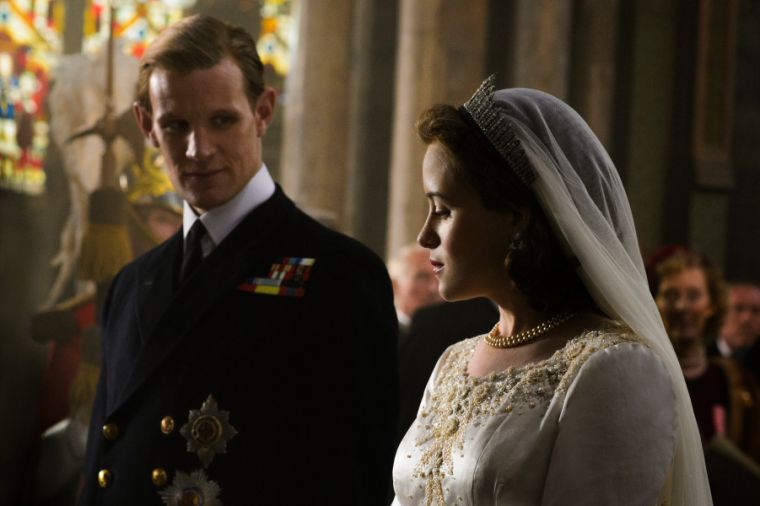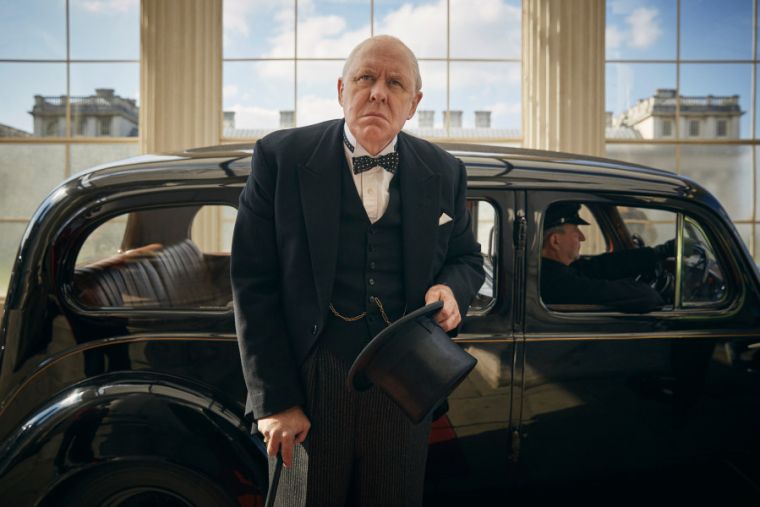The Crown: Why Christians Should Watch Neftlix's Royal Drama

Have you seen The Crown? Netflix's big-budget biopic about the early years of the monarchy of Queen Elizabeth II is a triumph, and if you haven't yet, you really must watch it. The drama isn't just excellent storytelling, but also a fascinating insight into the role that God and religion play in the life of the Queen, too. Elizabeth, who has now reigned for 64 years, is a committed Christian and has spoken openly about her personal faith in Jesus and the profound importance that faith has on her life.
When Elizabeth became Queen she became not only the Head of State but the Head of the Church also. For better or for worse, the idea of God is inescapably intertwined with her role and what she embodies. In The Crown, the tensions therein between State, Church, and family are tested to near breaking point. At the heart of it all though, are the characters who, despite all the pomp and circumstance that come with the monarchy, are still deeply human. There are many rich themes compellingly explored in this drama, here are just a few of them:
Chosen by God
The tradition of the divine right of Kings states that the authority of the monarch is derived from God, and is subject to no earthly authority. The tradition finds root in the stories of the anointing of Saul and David, found in 1 Samuel, though to say that all monarchies today have that same divine backing is of course a contentious claim. Nonetheless, the young Queen (played with elegance and innocence by Claire Foy) must grapple with the idea that she herself has been chosen by God for this particular role. She seeks counsel on this from her grandmother, Queen Mary:
"You said: 'loyalty to the ideal you have inherited is your duty above everything else, because the calling comes from the highest source. From God himself.' Do you really believe that?" Elizabeth asks.
Queen Mary responds: "Monarchy is God's sacred mission to grace and dignify the earth, to give ordinary people an ideal to strive towards, an example of nobility and duty to raise them in their wretched lives. Monarchy is a calling from God."
Whether you like the idea of a monarchy or not, it's hard not to be a little enchanted by such a lofty description. The idea of monarchy not as simply a raw assertion of power but as an ideal for people to strive towards – a symbol of something good, transcendent, even divine – is a beautiful one. It highlights God's benevolence toward the earth, his "mission to grace and dignify" it. For Christians, such a monarchy be only be fully found in the Kingship of Jesus, but the ideal exemplified in The Crown shows the power that human beings have to inspire and to be inspired, and to encourage others to aspire to greater things.
Royal heritage
The theme of transcendence is further explored when we see the splendour of the Queen's coronation, where she is crowned and anointed before a transfixed nation. Elizabeth makes her oath to her country and is anointed with holy oil, "In the name of the Father, of the Son, and of the Holy Ghost." Her uncle, the bitter Duke of Windsor, explains all the extravagant ceremony thus:
"Who wants transparency when you can have magic? Who wants prose when you can have poetry? Pull away the veil and what are you left with? An ordinary young woman of modest ability and little imagination. But wrap her up like this, anoint her with oil, and hey presto, what do you have? A goddess."
Beneath the crown sits an ordinary woman, but through that crown she is transformed into something else. Her high calling moves and changes her, as she labours for an ideal that transcends her own self. Perhaps such an image helps us understand what it means to be children of Jesus, sharing his royal heritage (Galatians 3:26), or what it means to be a kingdom of priests (Exodus 19:6, 1 Peter 2:9). Christians, like Elizabeth, are defined not by our ability, but by our calling. As one popular Christian idiom puts it: "God doesn't call the qualified, he qualifies the called."

The Crown takes the time to explore the rich humanity of those who, like the Queen and her friend and ally, the ageing Prime Minister Winston Churchill, struggle under the immense weight of their public lives. We see the strain that power and responsibility put on one's identity, family, and marriage. Matt Smith plays Elizabeth's husband, Prince Philip, who must now bow to the Queen, just as she once promised to obey him in marriage. His royal marriage costs him his family name and his Naval career, changing his life in ways that he had never intended. The Crown narrates their marriage with honesty and conviction, giving us neither a dull one-dimensional photograph nor an overly dramatic soap-opera. We see the deep love, cost and real frustration that surely come in any real marriage.
Elizabeth's father, the dying King George VI, gives Philip this wisdom: "You understand these titles, the dukedom... they are not the job. She is the job. She is the essence of your duty. Loving here. Protecting her."
These words ground the whole show, reminding not just Philip but the audience too of what is of ultimate importance. The Crown is not about the curiously adorned royal headgear, but about what it represents. It is about wisdom in leadership, and character in the midst of crisis. In a cynical age, people need something to aspire to. In a world over-saturated with celebrity and façade, people also need something real. The Crown delivers both, beautifully and spectacularly.
The Crown is available to stream on Netlfix now.











